From everyday conversations to the works of Shakespeare, hyperbole examples are used as figurative language everywhere, adding color and intensity to language.
It can be a very effective literary device for expressing emotion and conveying ideas. Hyperbolic statements may be funny, serious, or even sarcastic — it all depends on context and tone of voice.
But what is a hyperbole, exactly? How is it used? And how on Earth do you pronounce hyperbole?
This article will dive deep into the world of hyperbole, providing 55 vivid examples and explaining how to wield this technique effectively to enrich your own writing.
We’ll also cover the hyperbole definition and some tips to use hyperbolic language effectively.
Let’s embark on this exciting linguistic journey!
What Is a Hyperbole?

The word hyperbole (pronounced hi-PER-buh-lee) is a literary device where exaggeration is used to create strong feelings or emphasize a point.
Hyperbole often uses exaggerated words and phrases to make a point but aren’t literally true.
For example, when someone says “I’m starving!” after skipping breakfast, they don’t actually mean that they are about to die from hunger.
A hyperbole can be playful, humorous, or even heartfelt but always has the intent to bring attention to whatever the writer wants to emphasize.
Common Hyperbole Examples
Here are some common hyperbole examples found in everyday speech and conversation:
- “I’m so hungry, I could eat a horse!”
- “He is as strong as an ox!”
- “That was so expensive it nearly broke the bank!”
- “She was shouting louder than thunder!”
- “I’m so full I could burst.”
You obviously can’t literally eat a horse or be as strong as an ox (unless you’re Arnold Schwarzenegger).
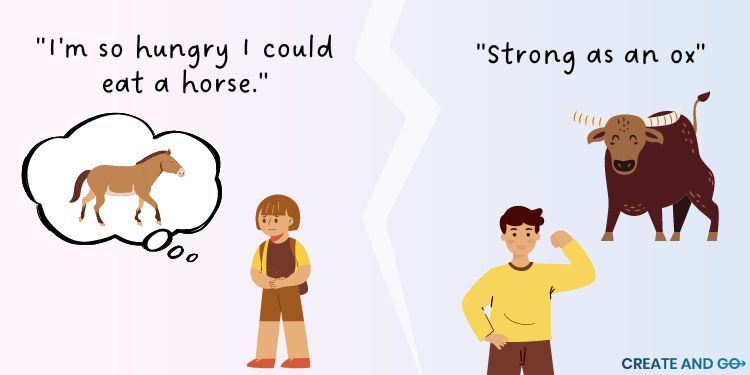
As you can see, hyperbole uses exaggeration to denote extreme emotions.
You might hear hyperbole uttered when someone is feeling particularly overwhelmed, frustrated, happy, or even scared.
55 Examples of Hyperbole
Hyperbolic language can be found in a variety of contexts. Let’s explore each one with some popular examples of hyperbole.
Hyperbole in Literature
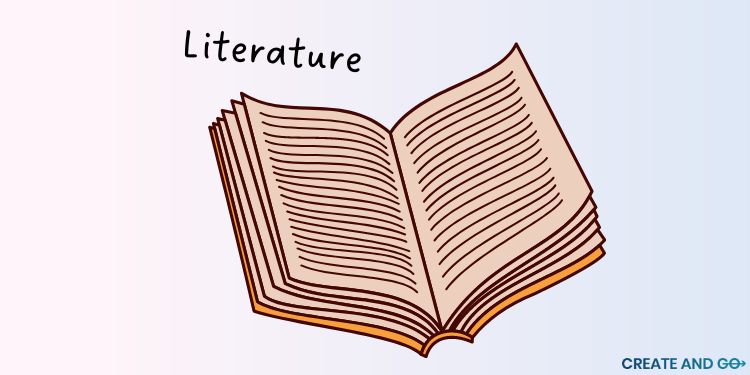
Literature is full of hyperbole – from novels to poetry to historical texts.
Here are some great examples from famous works used to create emotion in stories and characters:
- “My love for you is deeper than the ocean” — Romeo and Juliet by William Shakespeare
- “I gasped an entire ocean of air” — The Catcher in the Rye by J.D Salinger
- Her heart was beating a thousand miles a minute” — Pride and Prejudice by Jane Austen
- “He was as tall as a mountain” — The Adventure of Huckleberry Finn by Mark Twain
- “My love for you burns brighter than the sun” — Romeo and Juliet by William Shakespeare
- “The waves were roaring like a lion” – Moby Dick by Herman Melville
- “I felt a chill that stood my hairs on end” — Frankenstein by Mary Shelley
- “It was so cold I nearly froze to death” – A Christmas Carol by Charles Dickens
- “My heart was pounding like a hammer” – Wuthering Heights by Emily Bronte
- “His eyes were like two stars burning bright” — The Odyssey by Homer
- “She was so beautiful, she could have stopped the sun from setting” — The Princess Bride by William Goldman
- “Their laughter was like a thousand bells ringing” — Alice’s Adventures in Wonderland by Lewis Carroll
- “I am so tired, I could sleep for a hundred years” — Sleeping Beauty by Grimm Brothers
- “He was running like the wind” — The Iliad by Homer
- “Her heart was as heavy as a mountain” — The Little Prince by Antoine de Saint-Exupéry
Hyperbole in Everyday Conversation

Hyperbole examples can also be found all around us, in everyday speech and casual conversations.
The following examples are some that you’ve probably heard before:
- “I had to walk a million miles to get home”
- “I was so hungry I could eat a cow!”
- “My brain is fried from all this studying”
- “That cost me an arm and a leg!”
- “I’m so tired I can’t keep my eyes open”
- “It’s so hot, I’m melting!”
- “My stomach is in knots”
- “He’s talking a mile a minute!”
- “I’ve told you a million times!”
- ”This is taking forever!”
- “That was so easy, a baby could do it!”
- “I worked my fingers to the bone”
- “It’s raining cats and dogs out there!”
- “I have a million things to do today!”
- “I’m so mad my blood is boiling!”
Hyperbole in Film and Television
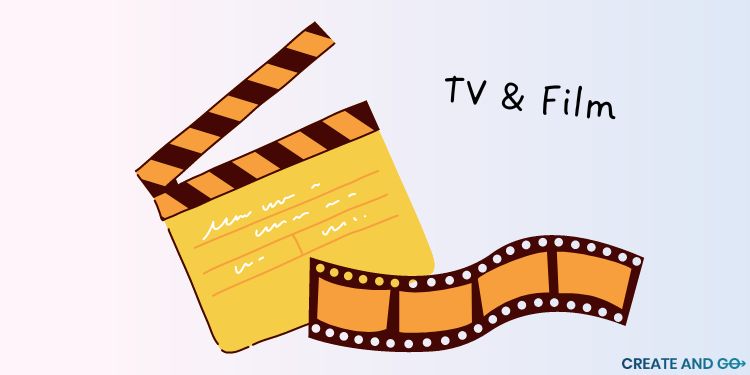
Hyperbole can often be found in film and television, used to make dialogue more interesting and engaging.
Here are a few examples:
- “I’m so angry, I could explode!” – Monsters Inc.
- “If my heart was a prison, you would be the prisoner” – The Notebook
- “My heart is breaking into a million pieces” – Love Actually
- “It was so loud it could wake the dead!” – The Simpsons
- “That’s enough to make your head spin!” – The Office (US)
- “I’m so scared I could die” – The Goonies
- “My heart is pounding a mile a minute!” – Grey’s Anatomy
- “I’m so nervous I could throw up!” – Mean Girls
- “My eyes are burning a hole through you” – Breaking Bad
- “I’m so angry, I could spit fire!” – Despicable Me
- “That was the longest day of my life” – How I Met Your Mother
- “We were running faster than the speed of light” – The Matrix
- “My heart was beating faster than a drum” – Avatar
- “It was so funny I almost died laughing!” – The Big Bang Theory
- “It was so cold, I saw polar bears wearing jackets” – The Simpsons
Hyperbole in Songs and Music
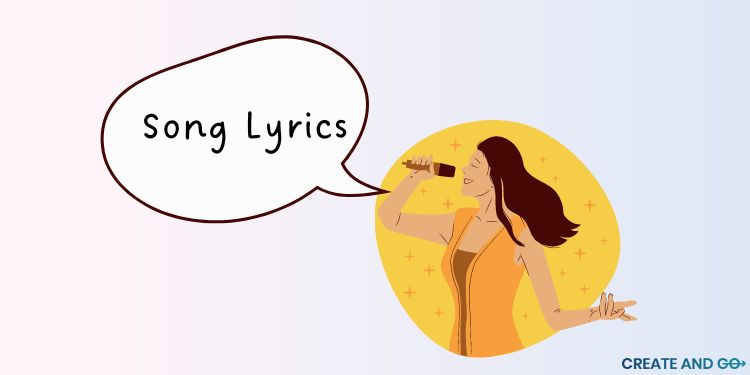
Hyperbole is so often found in popular music, as it can help convey intense emotion and deepen the impact of lyrics.
Here’s a list of hyperbole examples used in songs:
- “Burning brighter than the sun” — Rihanna
- “My love is like a river” — Alanis Morissette
- “Take me higher than I’ve ever been before” — Alicia Keys
- “I can’t live without you by my side” — Mariah Carey
- “It feels like a million miles away” — Coldplay
- “You turn my world around” — Michael Jackson
- “I’m so high I can hear heaven” — Katy Perry
- “My heart is beating like a drum” — Justin Bieber
- “I could travel the world and never find another you” — Ed Sheeran
- “My love is like a flower” — Miley Cyrus
- “My love for you is like a river running wild” – River by Leon Bridges
- “This love is so deep, it goes beyond the sea” — Bruno Mars
- “Why don’t you take me for a ride? Go faster than the speed of light” – Uptown Funk by Mark Ronson feat. Bruno Mars
- “It felt like a million butterflies were flying around my heart” – When I Was Your Man by Bruno Mars
- “We were walking on the moon” — The Script
10 Tips for How to Use Hyperbole Effectively
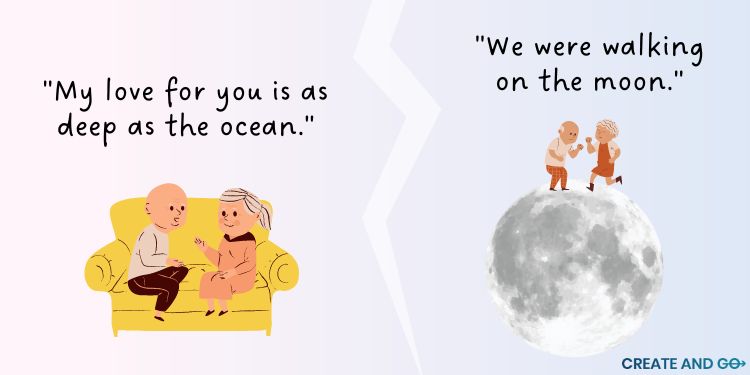
When you’re writing for an audience, it’s important to think about how the language you’re using will be received.
Hyperbole can be effective tools for communicating an emotion, but if an exaggeration is overused it, can become tedious, too dramatic, or even offensive.
Here are some tips for using hyperbole effectively:
- Use sparingly – too many hyperbole in close succession will drown out the impact of each one
- Use for comedic effect – when used correctly, hyperbole can create an interesting contrast and add humor to your writing
- Stick to one emotion per sentence – mixing multiple emotions in a single sentence can make the meaning less clear
- Make sure it fits the context – if you’re writing about something serious, over-the-top hyperbole might not be appropriate
- Don’t use clichés – they can be unoriginal and detract from the impact of your writing
- Use specific details – instead of saying “I was so hungry I could eat a cow”, try something more unique like “I was so hungry I could eat an entire bakery”
- Stick to facts when relevant – if you are writing about something that actually happened, don’t embellish the facts with exaggerated language
- Use a variety of hyperbole – if you’re using multiple hyperbole in one piece of writing, make sure to mix it up so they don’t all sound the same
- Don’t be afraid to get creative – hyperbole can help you express abstract ideas in a concrete way
- Be aware of your audience – consider who you’re writing for and what kind of language might be more or less appropriate
By following these simple tips, you can ensure that your use of hyperbole adds to the impact of your writing without becoming overly exaggerated or clichéd.
Literary Terms Related to Hyperbole
There are a number of other literary terms in figurative language related to hyperbole that have been used throughout literature.
- Meiosis – Meiosis is an understatement, often used for comedic or ironic purposes. An example would be saying “I’m just a little bit tired” when you’re exhausted beyond belief.
- Colloquialism – colloquialism is a casual phrase or expression that isn’t used in formal writing, e.g., “It’s raining buckets”
- Catachresis – Catachresis is a type of metaphorical expression that uses an incorrect term in order to provide emphasis or vivid description. For example, saying “He was so mad he could spit nails” is a catachresis because it implies more power and intensity than what is possible with words alone.
- Oxymoron – An oxymoron is a combination of two contradictory terms, such as “the living dead” or “sadly happy.”
- Irony – Irony is the use of words that contrast with their literal meaning, often for an amusing or sarcastic effect. An example of irony would be saying “That was a great vacation!” after spending two weeks in miserable weather conditions.
- Antithesis – Antithesis is the juxtaposition of two ideas in order to create contrast. For example, saying “you can’t have your cake and eat it too” is an example of antithesis.
- Euphemism – A euphemism is a milder and often more polite way of expressing something. For example, instead of saying “he died” you might say “he passed away.”
- Personification – Personification is a figure of speech that gives human traits or qualities to non-human objects, such as saying “the wind was laughing at me” or “the trees are dancing in the breeze.”
- Idiom – an idiom is a phrase that means something different from what its literal words suggest, e.g., “it’s raining cats and dogs”
- Anthropomorphism – Anthropomorphism is similar to personification, but instead of giving human traits to non-human objects, it gives human traits to animals or even gods. An example would be saying “the dog was crying in his sleep” or “the sun smiled down on us.”
- Simile – A simile is a comparison between two unlike objects, usually joined by the words “like” or “as.” For example, saying “my heart was beating like a drum” is a simile.
- Imagery – Imagery is language that evokes the senses and appeals to the reader’s imagination, e.g., “The sky was an ocean of stars”
- Metaphor – a metaphor is an indirect comparison between two unlike things, e.g., “my heart was a broken mirror”
FAQs About Hyperbole
Final Thoughts on Hyperbole Examples
The hyperbole definition is an exaggeration used to emphasize a point or emotion. These exaggerated statements are found everywhere from literature to TV and film and everyday conversations.
Hyperbole is often used as figurative language in writing and speech to create a heightened effect, from comedic to dramatic.
When properly executed, hyperbole can be very effective at communicating certain ideas or emotions.
When using hyperbole in your own writing, keep the tips mentioned earlier in mind. Be sure to use them sparingly and make sure they fit the context of your writing.
Remember, hyperbole can be an effective tool for communicating with your audience, so make sure to use them wisely!
With practice, you can become a master of the art of using hyperbole!